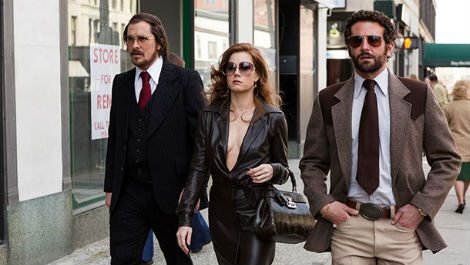
 Last week, my StageBuddy colleague Nick wrote an article claiming that David O. Russell's "American Hustle" is a worse version of Martin Scorsese's "The Wolf Of Wall Street". While varying perspectives are essential to art of any kind, I couldn't just let that allegation against my second-favorite movie of the year slide without a response. So here it is:
Last week, my StageBuddy colleague Nick wrote an article claiming that David O. Russell's "American Hustle" is a worse version of Martin Scorsese's "The Wolf Of Wall Street". While varying perspectives are essential to art of any kind, I couldn't just let that allegation against my second-favorite movie of the year slide without a response. So here it is:
Nick lauds Scorsese for focusing on only one character for a three-hour stretch of time, while "Hustle" tries to cram too many characters into a mere two hours. This would be defensible if Leonardo DiCaprio's scoundrel Jordan Belfort was actually worthy of a three-hour examination. Unfortunately, he's just not that interesting. At the beginning of the film, Belfort is sort of a jerk. By the end of it, he's a huge one. That's the entirety of his character arc. Why were three hours needed to tell this tale? I understand that the film's excessive running time was meant to reflect the excessive lifestyle of the film's characters -- but it's still just too long.
Earlier this year, "Gravity" proved that you don't need a bloated running time to tell a compelling story. In just ninety minutes, that film crafted a three-dimensional character with a well-rounded arc packaged inside a thrilling story of peril and triumph. "Hustle" may have more characters and a shorter running time than "Wolf", but all of them are more interesting and more fully-realized than Belfort's one-dimensional monster. There's Christian Bale's surprisingly sensitive conman Irving, who finds himself in over his head; Bradley Cooper's sadistically determined FBI agent Richie, who considers his reputation more important than the law; Amy Adams' Sydney, Irving's enigmatic partner who will adopt any number of masks in order to guarantee her own survival; and Jennifer Lawrence's Rosalyn, Irving's dissatisfied wife who fills up her empty marriage with booze and a burn-it-to-the-ground attitude. Unlike Belfort, all these characters are recognizably real people, with hopes and dreams beyond buying the biggest yacht or achieving the biggest high. Yes, the film's focus bounces around between the multitudinous cast members, but that's because it's a complex story that affects many lives. "Wolf" could have used less focus in order to capture the wide-ranging effects of Belfort's crimes.
 Nick also claims that the single biggest reason audiences are connecting with "Hustle" more than "Wolf" is because of the latter's use of sex. However, no one who knows what they're getting into with a Scorsese film would be particularly shocked at the sex on display here. The repeated slow-motion orgies effectively capture the mind-numbing lavishness of Belfort's lifestyle. Belfort views women as a commodity as commonplace as drugs, and Scorsese's use of sex appropriately mirrors that chauvinistic mindset. But Nick's argument also diminishes the importance of sex in "Hustle". Rather than being used as objects to make a point, the women in "Hustle" turn their sexuality into an asset. Sydney uses her body like a magician uses an assistant: for distraction. While the men are busy ogling her plunging necklines, she handily one-ups them all. And Rosalyn uses her youthful sensuality as the ultimate weapon in her desperate war against an apathetic husband. The problem is not that there's more sex in "Wolf" -- it's simply that "Hustle" uses it much better.
Nick also claims that the single biggest reason audiences are connecting with "Hustle" more than "Wolf" is because of the latter's use of sex. However, no one who knows what they're getting into with a Scorsese film would be particularly shocked at the sex on display here. The repeated slow-motion orgies effectively capture the mind-numbing lavishness of Belfort's lifestyle. Belfort views women as a commodity as commonplace as drugs, and Scorsese's use of sex appropriately mirrors that chauvinistic mindset. But Nick's argument also diminishes the importance of sex in "Hustle". Rather than being used as objects to make a point, the women in "Hustle" turn their sexuality into an asset. Sydney uses her body like a magician uses an assistant: for distraction. While the men are busy ogling her plunging necklines, she handily one-ups them all. And Rosalyn uses her youthful sensuality as the ultimate weapon in her desperate war against an apathetic husband. The problem is not that there's more sex in "Wolf" -- it's simply that "Hustle" uses it much better.
In his most interesting argument, Nick says that "Hustle" is a mere imitation of better Scorsese movies. This is a point repeated by most of the film's detractors. With its fast rhythms and loose morals, there are many attributes in "Hustle" that can also be found in Scorsese's work. But this claim ignores the more important point: that "Wolf" itself is a mere imitation of better Scorsese movies. From the opening moments where Belfort begins narrating his own life story directly to the camera, "Wolf" resembles nothing so much as a pastiche of "Goodfellas". Here are just a few other motifs Scorsese borrows from his own best movie: a story based on a real-life criminal; a rags-to-riches plot; glorification of the protagonist's lifestyle; a general lack of consequences for bad behavior; and its use of photographs, home videos and informercials to give the story an outside perspective. All of this felt new and exciting 24 years ago. Now it feels been-there-done-that. In the case of "Who did the better Scorsese imitation?" -- this year the answer is David O. Russell.
While "Hustle" does employ some of these same tools (most noticeably the narration), it succeeds as often as "Wolf" falls short. While "Wolf" tells the story of one bad man making many bad choices with little to no consequences, "Hustle" tells the story of several complex people making bad choices with many tragic consequences. Unlike Belfort, the characters in "Hustle" aren't just trying to amass as much money and drugs as possible -- they're trying like hell to survive in an increasingly unbalanced world. Whether they're fighting for respect, love, or their lives, they're all fighting for something, which is more than can be said for Belfort and his band of narcissists and misogynists. And when Russell's characters make decisions, there are consequences: reputations, careers and sometimes even lives are on the line. In "Wolf", not only does Belfort not care about the consequences...neither, apparently does Scorsese.
 Both Scorsese and DiCaprio have gone on record to claim that "Wolf" is not a glorification, but a condemnation of Belfort's behavior. But you'd never know it by watching the movie. Obviously we're not meant to sympathize with DiCaprio's coke-snorting, wife-hitting sleaze. But the film also falls well short of directly condemning him. Sure, Belfort ends up spending 36 months in prison, but that seems like small potatoes compared to the many lives he destroyed. And by the end of the film, he's out of jail and working as a motivational speaker, influencing more minds to his way of egocentric thinking. (Heck, Scorsese even rewards the real-life Belfort with a cameo in the film!) That may be how the story really ended, but you wouldn't have to change any facts to condemn him. Those many lives Belfort destroyed? Scorsese makes the irresponsible choice of ignoring them completely. Not once do we meet a victim of Belfort's fraud. In sheltering us from the very real ramifications of Belfort's actions, Scorsese makes it easier for more people to follow in his footsteps. This is particularly dangerous when crafting a film not about bygone archetypes like gangsters, but the very real, insidious threat posed by men like Belfort.
Both Scorsese and DiCaprio have gone on record to claim that "Wolf" is not a glorification, but a condemnation of Belfort's behavior. But you'd never know it by watching the movie. Obviously we're not meant to sympathize with DiCaprio's coke-snorting, wife-hitting sleaze. But the film also falls well short of directly condemning him. Sure, Belfort ends up spending 36 months in prison, but that seems like small potatoes compared to the many lives he destroyed. And by the end of the film, he's out of jail and working as a motivational speaker, influencing more minds to his way of egocentric thinking. (Heck, Scorsese even rewards the real-life Belfort with a cameo in the film!) That may be how the story really ended, but you wouldn't have to change any facts to condemn him. Those many lives Belfort destroyed? Scorsese makes the irresponsible choice of ignoring them completely. Not once do we meet a victim of Belfort's fraud. In sheltering us from the very real ramifications of Belfort's actions, Scorsese makes it easier for more people to follow in his footsteps. This is particularly dangerous when crafting a film not about bygone archetypes like gangsters, but the very real, insidious threat posed by men like Belfort.
The fact of the matter is, Scorsese seems to have no opinion at all on his own subject. And if he has no opinion, then why should I watch it? In his strained attempts at remaining neutral, Scorsese forgot to give me any reason at all to care about his film. In "Goodfellas", Scorsese clearly had a long-standing affection for the legendary gangsters of his childhood, and his investment in their story helped him to craft well-rounded characters. Giving us permission to both care about a character and condemn their actions is a much more complex and interesting cinematic choice than merely showcasing bad behavior. This is exactly what Russell achieves so well. Irving may be a two-bit fraudster, but he's also a loving partner to Sydney and a good friend to Jeremy Renner's Mayor Carmine. Sydney may be a conniving manipulator, but she's also just a woman who finds herself caught up in something much bigger than she bargained for. Russell allows us to want to see these characters get away with it, which makes us invested in the outcome, which in turn makes "Hustle" an exceedingly exciting film to watch. When it comes down to it, Scorsese is simply too contemptuous of his subject in "Wolf" to craft a compelling film. He never once gives us a reason to root for Belfort, which renders the entire film a torturously prolonged and ultimately pointless experiment in masturbatory excess.
If you see only one comedic crime caper inspired by Scorsese this Oscar season, skip the one made by Scorsese.
Are you Team Hustle or Team Wolf? Tweet us @Stagebuddy!